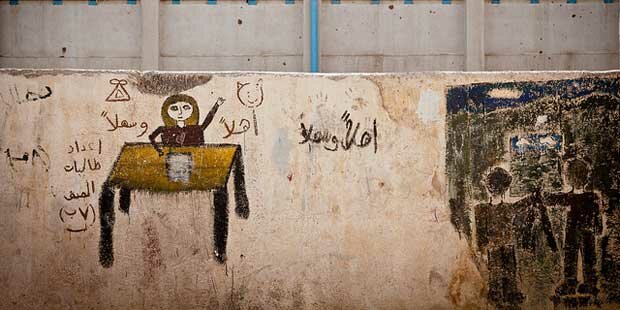In virtually every Arab country, being a Palestinian refugee is something of a bureaucratic nightmare. For Palestinians forced out of their homes in Syria by war, Jordan has been anything but welcoming.
Jordan likes to present itself as a hospitable country, being the haven for over 200,000 Syrians according to official figures. But not for the 1,550 Palestinian refugees from Syria carrying UN travel documents; Jordan is trying to push them back out of the country.
The Interior Ministry refuses point blank to describe the Palestinians as refugees, repeatedly insisting that theirs “is a special case and therefore they will be dealt with gently until things clear up”. This “gentle treatment” translates into depriving them of their rights as refugees. The Ministry has already issued a final decision barring the Palestinians from getting any official financial support. In comparison, their Syrian peers were supported financially from the beginning of the conflict (though the Ministry implemented regulations in April 2012, decreasing the numbers of those eligible).
The decision not to support the refugees blatantly breaches the 1965 Casablanca Protocol signed by Arab ministers of state, and which states that Palestinians are to be treated the same as citizens of the country they live in.
Adding insult to injury, the Syrian Palestinians have been termed “economic migrants” who merely left their homes in search of better work. On top of that, the Palestinians have been detained in special facilities set aside by the Jordanian authorities in the city of Al Mafraq (68 km north east of the capital Amman), with 170 being transferred to the Cyber City facilities in Al Ramtha (95 km north of Amman). Yes, the same housing that was criticized as substandard years ago by advocacy groups (when it was set aside for Bengali laborers working in the free trade industrial area.)
In the end, Palestinian refugees remain the responsibility of the UNRWA [the UN agency set up to deal with them]no matter what country they live in; in this case their jurisdiction just moves from the Damascus office to the organization’s Jordan office. The problem is that the UNRWA just does not have the means to take care of them, so the new Palestinian refugees are being shortchanged vis a vis the other refugees from Syria.
The decision not to provide them with support pushed many of them to escape the imprisoning walls of the facility, to face an even harsher reality. Their escape made them criminals wanted by the authorities, and while some were able to find refuge with their Jordanian Palestinian relatives, most found the doors of all aid organizations closed to them.
To circumvent this situation, many of the Syrian Palestinians arrive at the Jordanian border withholding their documents, and pretending they are Syrians whose paperwork was lost or couldn’t be accessed during the escape. They end up in the Syrian refugee camps, hoping for support. So there is no way to estimate how many Palestinians have actually come to Jordan, their numbers lost among the thousands of other refugees from Syria.
Initially, the Palestine embassy in Jordan had announced that it would send any Palestinians from Syria who desired to Gaza; but refugees who actually sought the embassy’s help found the doors closed. The embassy’s failure to help was the reason the Syrian Palestinians ended up demanding that the Palestinian Authority stop interfering in their cases. What they want is to be treated like normal war refugees by the United Nations, allowing them to be resettled outside the region.
So why are we discriminating against Palestinian refugees from Syria? The answer is the secret fear among so many Jordanians: the Palestinian fifth column here. The Syrian citizens, sooner or later, will return home. But Jordanians worry that their government will settle the Syrian Palestinians here; grant them Jordanian citizenship, making even larger than the enormous number of Jordanians of Palestinian origin. The way the authorities dealt with the Palestinians was meant, therefore, to allay the fears of those apprehensive about the unwanted refugees. Tough luck if you happen to be one of them.
Mohammed Al Fudaylat
10 Apr 2013




































